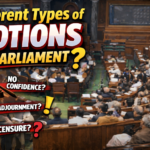The Supreme Court Contempt Powers: A Pillar of Judicial Authority

The Supreme Court refused to entertain a PIL seeking Contempt of Court(COC) proceedings against BJP MP Nishikant Dubey. The PIL is against his remarks against the top court and CJI Sanjiv Khanna.
LEARNING FROM HOME/WITHOUT CLASSES/BASICS
Contempt of Court
COC as a concept that seeks to protect judicial institutions from motivated attacks and unwarranted criticism. A legal mechanism to punish those who lower its authority.
Under Articles 129 and 142 of the Constitution the Supreme Court has been vested with power to punish for COC. It includes the power to punish for contempt of itself. The COC Act, 1971, gives statutory backing to the idea.
In case of contempt other than the contempt referred to in Rule 2, Part-I of the Rules to Regulate Proceedings for Contempt of the Supreme Court, 1975, the Court may take action. (a) Suo motu, or (b) on a petition made by Attorney General, or Solicitor General, or (c) on a petition made by any person, and in the case of a criminal contempt with the consent in writing of the Attorney General or the Solicitor General. Article 215 conferred a corresponding power on the High Courts.
Under Indian law, contempt of court has been divided into two categories: civil and criminal contempt. The recent amendment in the COC Act, 1971 has added Section 13(b). The provision has added the exception of truth as a defence for COC.
Civil contempt means willful disobedience to any judgment, decree, direction, order, writ, or other process of a Court. Or willful breach of an undertaking given to a Court (section 2.b).
Section 2.c says that Criminal Contempt means the publication (whether by words, spoken or written, or by signs, or by visible representation, or otherwise) of any matter or the doing of any other act whatsoever which.
i. Scandalizes or tends to scandalize, or lowers or tends to lower or tends to lower the authority of, any court,
ii. Prejudices, or interferes or tends to interfere with, the due course of any judicial proceeding: or
iii. Interferes or tends to interfere with, or obstructs or tends to obstruct, the administration of justice in any other manner.
It can be easily drawn that COC forms an important part in the original jurisdiction of the Court. And is therefore a necessary part of the constitution. It gives the Court extraordinary powers to protects its dignity and integrity. So that the confidence of the people remains in the judiciary. Also, the stream of justice is of utmost importance. And the judiciary should remain free from the executive control when the matter is with respect to the dignity of the Court.
Article 19 (1)(a) of Indian Constitution provides for freedom of speech and expression as fundamental right. Article19(2) provides for reasonable restriction and contempt of court expressly mentioned as reasonable restriction in our constitution.
Both freedom of speech and power of contempt are vital for a democratic setup. Freedom of speech ensures judicial accountability whereas power of COC ensures fair administration of justice.






0 Comments